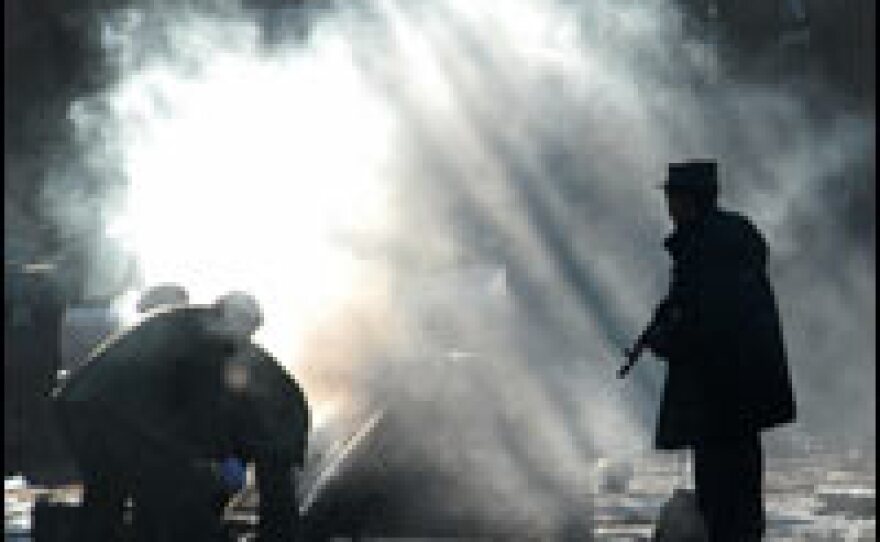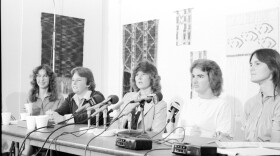

Defense Secretary Robert Gates is sending more than 3,000 Marines to Afghanistan to guard against a possible Taliban offensive in the spring. This comes after the U.S. was unsuccessful in getting NATO to boost its own forces there. With the steadily rising violence in Afghanistan, there are deeper questions about the alliance itself.
More than six years after they were toppled in Afghanistan, Taliban forces are resurgent. An average of 400 attacks occurred each month in 2006. That number rose to more than 500 a month in 2007.
"It appears to be a much more capable Taliban, a stronger Taliban than when I was there," says retired Lt. Gen. David Barno, who was the top commander in Afghanistan from 2003 through 2005. "Just the size of engagements, the casualties reflected in the Taliban [attacks] show a stronger force."
And Barno says that the United States may have unwittingly contributed to that resurgence beginning in 2005 — first, by announcing it was turning over responsibility for the Afghan military operation to NATO and second, by cutting 2,500 American combat troops. That sent a message to friend and foe alike, Barno says, that the U.S. was moving for the exits.
NATO commands most of the 54,000 soldiers in Afghanistan, nearly half of whom are American. Defense Secretary Robert Gates wanted NATO to send 7,000 more troops.
Appearing before Congress just last month, Gates wasn't ready to mince words: American troops were stretched in Iraq, and NATO troops were needed in Afghanistan for combat duty and for training Afghan forces.
"I am not willing to let NATO off the hook in Afghanistan at this point," Gates said.
By last week, Gates was ready to do just that. On his desk was a plan to send several thousand U.S. Marines to Afghanistan for combat and training duty. The proposal made him even more worried about the NATO alliance.
"I am concerned about relieving the pressure on our allies to fulfill their commitments," Gates said.
But with violence flaring in Afghanistan, Gates had little choice but to turn to the Marines.
Meanwhile, other defense officials complain that NATO is not focused enough on the most important part of winning the insurgency in Afghanistan: Making life better by creating jobs, clinics and roads.
That left Gates in a recent appearance before Congress to question the future of NATO, an alliance created to fight the Soviets.
"The Afghan mission has exposed real limitations in the way the alliance is organized, operated and equipped," Gates said. "We're in a post-Cold War environment. We have to be ready to operate in distant locations against insurgencies and terrorist networks."
Those problems are spurring several Pentagon reviews about the way ahead in Afghanistan. One option being discussed would give the U.S. an even greater combat role in the country's restive south, now patrolled by Canadian, British and Dutch forces.
At the same time, there is talk of appointing a high-level envoy to better coordinate international aid for Afghanistan. One name being mentioned is Paddy Ashdown, a former member of the British Parliament who held a similar post in Bosnia.
That makes sense to American officers like Col. Martin Schweitzer, who commands the 4th Brigade Combat Team in Khost province in eastern Afghanistan. He says more experts are needed to give Afghans a better life.
"Specifically, we need assistance with agrarian development, natural resource development, like natural gas, etc., because there's natural gas in the ground here," Schweitzer said. "And we need those smart folks to come over here and help us get it out, so you can turn it into a product that can help sustain the government and the country."
A more robust Afghan economy may help cut into Taliban recruitment of a large pool of the unemployed. But Barno and others caution that the Taliban are a regional problem. There's a steady flow of radicalized recruits pouring over the border from Pakistan.
Copyright 2022 NPR. To see more, visit https://www.npr.org. 9(MDAzMjM2NDYzMDEyMzc1Njk5NjAxNzY3OQ001))







